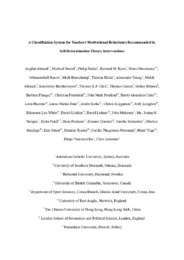Título :
A classification system for teachers’ motivational behaviors recommended in self-determination theory interventions |
Autor :
Ahmadi, Asghar 
Noetel, Michael 
Parker, Philip 
Ryan, Richard M 
Ntoumanis, Nikos 
Reeve, Johnmarshall 
Beauchamp, Mark 
Dicke, Theresa 
Yeung, Alexander 
Ahmadi, Malek 
Bartholomew, Kimberley 
Thomas K.F. Chiu
Thomas Curran
Erturan, Gökçe 
Flunger, Barbara 
Frederick, Christina 
Froiland, John 
González-Cutre, David 
Leen Haerens
Lucas Matias Jeno
Koka, Andre 
Krijgsman, Christa 
Langdon, Jody 
White, Rhiannon Lee 
Litalien, David 
Lubans, David 
Mahoney, John 
Nalipay, Ma. Jenina 
Patall, Erika 
Perlman, Dana 
Quested, Eleanor 
Schneider, Sascha 
Standage, Martyn 
Stroet, Kim 
Tessier, Damien 
Thogersen-Ntoumani, Cecilie 
Tilga, Henri 
Vasconcellos, Diego 
Lonsdale, Chris  |
Departamento:
Departamentos de la UMH::Ciencias del Deporte |
Fecha de publicación:
2023 |
URI :
https://hdl.handle.net/11000/30414 |
Resumen :
Teachers’ behaviour is a key factor that influences students’ motivation. Many
theoretical models have tried to explain this influence, with one of the most thoroughly
researched being self-determination theory (SDT). We used a Delphi method to create a
classification of teacher behaviours consistent with SDT. This is useful because SDT-based
interventions have been widely used to improve educational outcomes. However, these
interventions contain many components. Reliably classifying and labelling those components
is essential for implementation, reproducibility, and evidence synthesis. We used an
international expert panel (N = 34) to develop this classification system. We started by
identifying behaviours from existing literature, then refined labels, descriptions, and
examples using the Delphi panel’s input. Next, the panel of experts iteratively rated the
relevance of each behaviour to SDT, the psychological need that each behaviour influenced,
and its likely effect on motivation. To create a mutually exclusive and collectively exhaustive
list of behaviours, experts nominated overlapping behaviours that were redundant, and
suggested new ones missing from the classification. After three rounds, the expert panel
agreed upon 57 teacher motivational behaviours that were consistent with SDT. For most
behaviours (77%), experts reached consensus on both the most relevant psychological need
and influence on motivation. Our classification system provides a comprehensive list of
teacher motivational behaviours and consistent terminology in how those behaviours are
labelled. Researchers and practitioners designing interventions could use these behaviours to
design interventions, to reproduce interventions, to assess whether these behaviours moderate
intervention effects, and could focus new research on areas where experts disagreed.
|
Palabras clave/Materias:
taxonomy
engagement
intervention design
behaviour change techniques
BCT |
Área de conocimiento :
CDU: Filosofía y psicología: Psicología |
Tipo documento :
application/pdf |
Derechos de acceso:
info:eu-repo/semantics/openAccess |
DOI :
https://doi.org/10.1037/edu0000783 |
Aparece en las colecciones:
Artículos Ciencias del Deporte
|
 La licencia se describe como: Atribución-NonComercial-NoDerivada 4.0 Internacional.
La licencia se describe como: Atribución-NonComercial-NoDerivada 4.0 Internacional.
.png)
